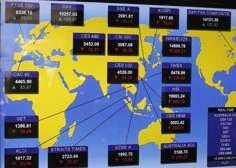Hong Kong stocks suffer biggest loss since Brexit, while China A shares climb to two and half month high

The Hang Seng Index on Tuesday saw its biggest fall since plunging 2.9 per cent after Britain’s Brexit vote on June 24, while mainland China A shares inched up above 3,000 for the first time in two and a half months.
The blue-chip index in Hong Kong closed at 20,750.72, down 1.46 per cent or 308.48 points, ending the upward trend seen over the past three trading days. The Hang Seng China Enterprises Index shed 1.81 per cent or 159.04 points to 8,643.31.
Utilities, banking and insurance sectors led the drop, while property developers and Macau casino operators pulled back from their strong gains seen in previous sessions. Galaxy Entertainment lost 3.63 per cent to HK$22.55 while Hang Lung Properties fell 3.45 per cent to HK$15.66.
The Hang Seng Index will continue to swing between 18,000 to 22,000 in the second half of the year, said Will Leung Chun-fai, executive director at Standard Chartered Bank (Hong Kong).
“The impact of Brexit is unlikely to trigger another sharp sell off in Hong Kong…although the negative impact has not been fully reflected on the British pound,” Leung said, adding that companies with high dividend yieldsremain the most sought-after stocks.
In the past five trading days, the blue-chip index has fully recovered from losses suffered in the wake of the stunning Brexit result, and even approached its the highest level in four weeks.
Alexander Lee, China and Hong Kong market strategist at DBS Vickers, also expects the Hang Seng Indexto stand at 22,000 by year’s end despite Tuesday’s correction.
Hong Kong retailers will benefit from the surging Japanese yen, but the low-interest-rate environment would hit banking sector, Lee said.
The mainland economy would be the major factor affecting Hong Kong’s market in the second half, with China’s central bank expected to lower the reserve requirement ratio before October, said StanChart’s Leung.
The Caixin services Purchasing Managers Index (PMI), a private gauge of China’s services sector which focuses on small and mid size enterprises, rose to an 11-month high of 52.7 in June, up from 51.2 in May. Government data also showed recently that the official services PMI increased to 52.2 in June from 52 in May.

On the mainland, the Shanghai Composite Index at one point Tuesday touched 3,010.27 but lost momentum, closing at 3,006.39, up 0.6 per cent or 17.79 points. The large-cap CSI300 was almost flat at 3,207.38, up 0.08 per cent or 2.69 points.
The Shenzhen Composite Index inched up 0.23 per cent or 4.69 points to 2,006.38. The start-up board ChiNext Index fell 0.12 per cent or 2.69 points to 2,246.02.
Total turnover in Shanghai and Shenzhen increased to 707.8 billion yuan (HK$823.5 billion), from 658 billion yuan on Monday.
Military and defence, airlines, and liquor sectors led the rally while property and software sectors dipped. Kweichow Moutai Co shares gained 2.27 per cent to reach a historic high of 300.58 yuan.
In Shenzhen, China Vanke, which is embroiled in a dramatic corporate battle, plunged by its daily limit of 10 per cent to 19.79 yuan. It marked the second straight day the stock has been limit down at the open since trading resumed Monday after being suspended for more than six months.
Daily turnover of Vanke’s A shares soared to 3.9 billion yuan in the last several minutes of trading from only 300 million yuan, propelling speculation that its hostile shareholder Baoneng Group was increasing its holdings.